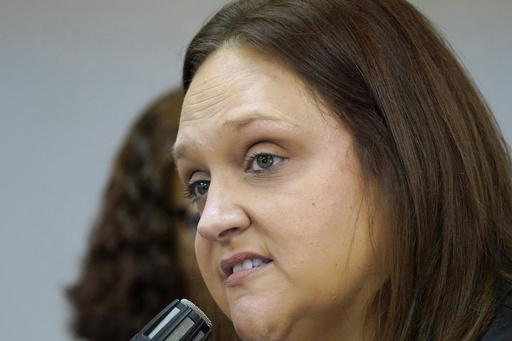JACKSON, Miss. (AP) — Mississippi is revising the restrictions it put in place last year on who can provide absentee voting assistance to people who have disabilities or cannot read or write — restrictions that were blocked by a federal judge before ultimately being altered by lawmakers.
An updated state law took effect Monday, changing one that the GOP-controlled Legislature passed and Republican Gov. Tate Reeves signed in 2023.
“This legislative change is a monumental step forward for voting rights in Mississippi, ensuring that every citizen’s voice is heard and respected,” Greta Kemp Martin, litigation director for Disability Rights Mississippi, said in a statement Monday.
Disability Rights Mississippi, the League of Women Voters of Mississippi and three voters sued the state in 2023, challenging the short list of people who could “collect and transmit” an absentee ballot. The list included employees of the U.S. Postal Service or other mail carriers such as FedEx or UPS, and any “family member, household member or caregiver of the person to whom the ballot was mailed.” A violation would have been punishable by up to a year in jail, a $3,000 fine or both.
U.S. District Judge Henry Wingate blocked the law from taking effect last year. He wrote that it violated the federal Voting Rights Act, which says any voter who is blind, disabled or unable to read or write may receive assistance “by a person of the voter’s choice,” other than their employer or union.
The new version of the Mississippi law reflects that portion of the Voting Rights Act. It also defines who is considered a caregiver, a family member or a member of a voter’s household. Democratic lawmakers who opposed the 2023 law said it was vague and could hurt candidates, campaign workers, nursing home employees or others who make good-faith efforts to help people obtain and mail absentee ballots.
Republican-led states have tightened rules on voting by mail since the 2020 presidential election, in part because of the false narrative of widespread fraud in that race. When Reeves signed Mississippi’s law in 2023, he said it was to prevent “ballot harvesting,” a pejorative term for dropping off completed ballots for other people.
One of the residents who sued the state, Mamie Cunningham, is director of a community organizing group and involved with Black Voters Matter in northeast Mississippi.
“Many people with disabilities in rural communities would not vote if they did not have assistance,” Cunningham said in a statement Monday. “In Mississippi, voting by absentee ballot is an overwhelming process even for people without disabilities.”
Some states allow widespread use of voting by mail, but Mississippi restricts the reasons people may vote by absentee ballot. The absentee ballots are available — by mail or for early, in-person voting — to Mississippi voters who are 65 or older; any voter who has a temporary or permanent physical disability, or any voter who is that person’s caretaker; and any voter who will be away from their home county on election day, including college students.
—
Rephrased content:
Mississippi has recently updated the restrictions on who can provide assistance with absentee voting to individuals with disabilities or those who cannot read or write. The restrictions, originally passed by the GOP-controlled Legislature and Governor Tate Reeves in 2023, were modified to comply with federal laws after being blocked by a federal judge. The updated law came into effect on Monday, allowing a broader range of individuals to assist with absentee voting.
Greta Kemp Martin, the litigation director for Disability Rights Mississippi, hailed the change as a significant advancement for voting rights in the state, ensuring every citizen’s voice is heard and respected. The revision was a result of a lawsuit filed by Disability Rights Mississippi, the League of Women Voters of Mississippi, and three voters in 2023, challenging the limited list of individuals permitted to collect and transmit absentee ballots.
The new Mississippi law adheres to the federal Voting Rights Act, allowing voters who are blind, disabled, or unable to read or write to receive assistance from a person of their choice, excluding their employer or union. In addition, the updated law defines who can be considered a caregiver, a family member, or a member of the voter’s household. Democratic lawmakers criticized the previous law for its ambiguity and potential negative impact on individuals assisting with absentee ballots.
States led by Republicans have been tightening voting by mail regulations since the 2020 election, driven by unfounded claims of widespread fraud. Mississippi’s revised law aims to prevent “ballot harvesting,” where completed ballots are dropped off for others. Mamie Cunningham, one of the plaintiffs in the lawsuit against the state, emphasized the importance of assistance for individuals with disabilities, especially in rural communities where voting processes, including absentee ballots, can be overwhelming.
While some states have liberalized mail-in voting, Mississippi restricts absentee voting to individuals aged 65 and older, those with physical disabilities (or their caretakers), and voters absent from their home county on election day. The changes in Mississippi reflect a nationwide debate on voting access and security.


